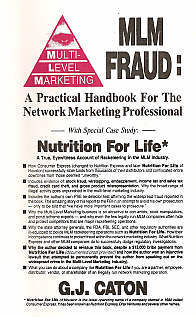 e are asked -- with surprising frequency -- to compare products that
we make with similar products in the multi-level marketing industry --
(for the last twenty years, "network marketing" has been the term in
greater circulation, because it performs the service of making
the multi-level marketing industry sound less like a collective
assortment of competing pyramid schemes).
 In addition, we are
solicited by MLM companies both on the sourcing side of
the distribution equation (i.e. the company wants to buy something
we make) and on the sales side (i.e. one of their distributors has it
in his or her mind that we will buy and resell their product(s), perhaps
even sign up and become one of their downline distributors).
Usually these unprovoked solicitations are executed with
some degree of stealth and we end up having to expend
valuable staff time to uncover the essence of the proposal.
 We would like to minimize this.
 This essay is not a wholesale
disparagement of the MLM industry. In a free market economy they
have just as much right to sell their wares to the public as
anybody else. There are, however, certain myths that could,
in the public interest, use expunging. They certainly have
confused a good many people we have encountered, and so they
should first be taken to task before proceeding:
Myth 1:
MLM Products Are
A Competitive Alternative To
Conventional Retail Marketing
 Embedded in the marketing
plans of countless MLM companies is the proposition that MLM
products ("our products!") are competitive --- that there is so much built-in
profit to be scooped up from the manufacturer to the wholesaler
through the brokers and other assorted middlemen to the
retail chain to the individual retail store -- not to mention
direct outflows that the manufacturer must make for advertising
and other promotional costs -- that MLM
is nothing more than the intelligent reallocation of all
that monstrous profit to YOU -- the MLM distributor!
 It's all nonsense.
 Admittedly, MLM has
an advantage over conventional retailing in that any product
with a story to tell, especially when the particulars are
not widely known, can be better pitched by a distributor
to a retail customer, one-on-one. After all, there is only so much you can say
in the "romance copy" of a product's "principal display panel."
 But that's where the
advantage ends.
 The commission
structures of the more successful MLM companies put
them at a huge disadvantage to other forms of retailing.
Example: at Alpha Omega Labs it is not uncommon
for us to purchase a product from another manufacturer
in quantity, paying the very same price that a large MLM company would pay,
private-labelling it, and then marking it up just 50%. In other words, the product
cost us $10 and we are retailing that product for just
$15. That very same product will retail in the MLM
pipeline for $70 to $100. It simply has to --- MLM companies cannot
survive on small markups.
 When we have been
approached by MLM companies in the past to purchase
something that WE manufacture (about 50% of everything
we sell is manufactured in-house), we are invaluably told
upfront, "Now realize that your price has to be
competitive enough for us to add our customary 5 to 10 times
markup!"
 What drives MLM
is not the product or its price.
 What drives MLM is
the "business opportunity" --- thus making the product a
means to an end and not the end in itself.
 MLM products are not
a competitive alternative to conventional retail
marketing for one very simple reason:
 They don't have to be.
 Let's look at another
example --- in terms of hour-for-hour entertainment value,
are gaming devices at any of the thousands of casinos and other gambling establishments
in North America competitive with even the most expensive Nintendo or Game Boy
products that entertain youngsters? Of course not.
 Some might not think
this is a fair comparison, but the fact is, both MLM marketing
programs and gambling establishments share an appeal for those
who believe in "Something for nothing."
 The gambler who sits
before a "one-armed bandit," believing he has a reasonable
chance of being the next big winner, is running off the very
same motivation that drives an MLM distributor to work a
downline in the hopes of soon retiring off the labor of
those beneath him. Both are motivated by the dream of
huge returns for comparatively small efforts expended.
And both are working in the hope that these rare
exceptions, and not the normal play of Universal or
Natural Laws -- will apply to them.
And this is what defines MLM --- it is a corporate-sponsored
form of a lottery . . . (Okay, maybe that's the best comparison . . .
Lotteries have a higher "percentage payout" then most
MLM companies -- "percentage payout" defined as the total
given out in winnings (commissions) divided by gross sales.)
 Since when do lotteries
have to be competitively priced?
 Answer: Answer: They don't.
Myth 2:
My MLM Company has
proprietary products not
available elsewhere
 Going well beyond
simple trademarks into patents, secret ingredients, secret
formulas, etc. -- we have YET to see a single product
in the MLM community for which there is not a similar
product available elsewhere for less -- MUCH LESS -- that does not, for
all intents and purposes, do the exact same thing.
 We know.
Top of Column Two
 Top of Page
Top of Page
|

 Early in my career
(going back to the mid-1970's) I used to
make the same frivolous arguments ---- and that was ...
well ... you know, a few years before the guilt complex set in.
 Among those who are on
the cutting edge of the alternative health care or nutraceutical
market are most often those who are on the cutting edge of
significant research expense.
 If you discovered
an ingredient or other proprietary health product and you
wanted to recoup your investment by maximizing the
distribution possibilities would you: (1) Sell exclusively
through an MLM company, or (2) Sell to both direct sales
and conventional retailing channels -- thus maximizing
sales potential? Everyone knows
the answer to that question. The "closed architecture"
model for the distribution of proprietary products doesn't
work --- or at the least can cause substantial loss of
market share. (Can you spell "Apple Computer"?)
 Whether it's "Sea
Silver," or transfer factor, or specialized colloidal minerals, or
"egg immune factors" --- you name it --- there are multiple
sources of supply.
 Excepting the fair use
of trademarks, which provide distinction between the product
of one maker versus those of his competitors, beware vendors who
will tell you, "You can only get this from us."
 A company may well own
a trademark, but rarely do they own the technology that
produces a given product's underlying functionality -- and if they
did, they certainly wouldn't restrict themselves to the
MLM market.
Myth 3:
The MLM Industry is highly
regulated so they are usually
truthful on product claims
 How about, "The MLM industry
is somewhat regulated, so they should be motivated to be
truthful about product claims?"
 All one has to do
(and this is if you live in the U.S., where most MLM
companies are hatched) is take a tour in the archives of
the U.S. Federal
Trade Commission web site (www.ftc.gov)
and check out the operations they are going after to dispel
this myth. Although there are a number of law-abiding
MLM and other direct sales companies, anyone who knows the
industry well (and I used to be an insider), knows that
MLM is VERY over-represented among those companies
that the federal and state attorney generals are having
to strong-arm into compliance, if not indicting,
attempting to indict, suing, attempting to sue, etc.
 Even those on
the inside at the various state Consumer Protection
divisions will tell you that most MLM companies are
hard to regulate or bring into compliance because they
do not advertise their outrageous or false claims --
but instead, let them propagate informally, via
word of mouth, throughout their network.
In addition, there are
too many companies
to regulate versus those assigned to enforcement.
 As for
self-policing, this
is almost non-existent in the MLM industry, since industry "watch groups,"
such as MLM Watchdog or
MLM Watch exist as media
for the publications' principals to shill their own latest plans.
(Another example of misdirection is MLM
Fraud, an organization that has nothing to do with reforming the
industry.)
 Given its propensity for
legal entanglements, few are surprised that the industry has,
just within the last twenty years, given rise to
attorneys
specializing in defending MLM companies.
 (Similar points on this issue
are made in Vandruff's piece:
What's Wrong With Multi-Level Marketing?)
Our Position
 Shorn of all myth, our position on MLM becomes clear:
- We don't wholesale to MLM companies because we cannot
control their distributors from making "over the line"
health claims. Plus, sales through MLM channels would
compete with our own resellers and involve markups
which we regard as excessively out of line with market
value. MLM companies must charge these exorbitant
prices to support the commissions given to their
distributor network -- many involving "heavy hitters"
who got in early, are sitting at the top, living off the
fat, and haven't really "worked the organization" in a long time.
- We don't purchase anything from MLM companies
because their pricing is excessive and most of them
do not make their own products anyway. Our own
manufacturing sourcing -- both in-house and out-sourced --
is as good or better than the purchasing power of
even the largest MLM companies.
- We run a streamlined operation, no one "lives off
the fat," and we work hard to offer the best products
for the best prices in the industry.
- We keep a healthy distance from the MLM community,
since we do not wish to be associated, even
tangentially, with the health claim exaggerations
that so thoroughly permeate that business.
Sure, we are strident, and we certainly have no
problem taking the authorities to task when they don't
act in a way that has the consumer's interests at
heart. But making claims we know to be false or
exaggerated is something we don't do.

|





